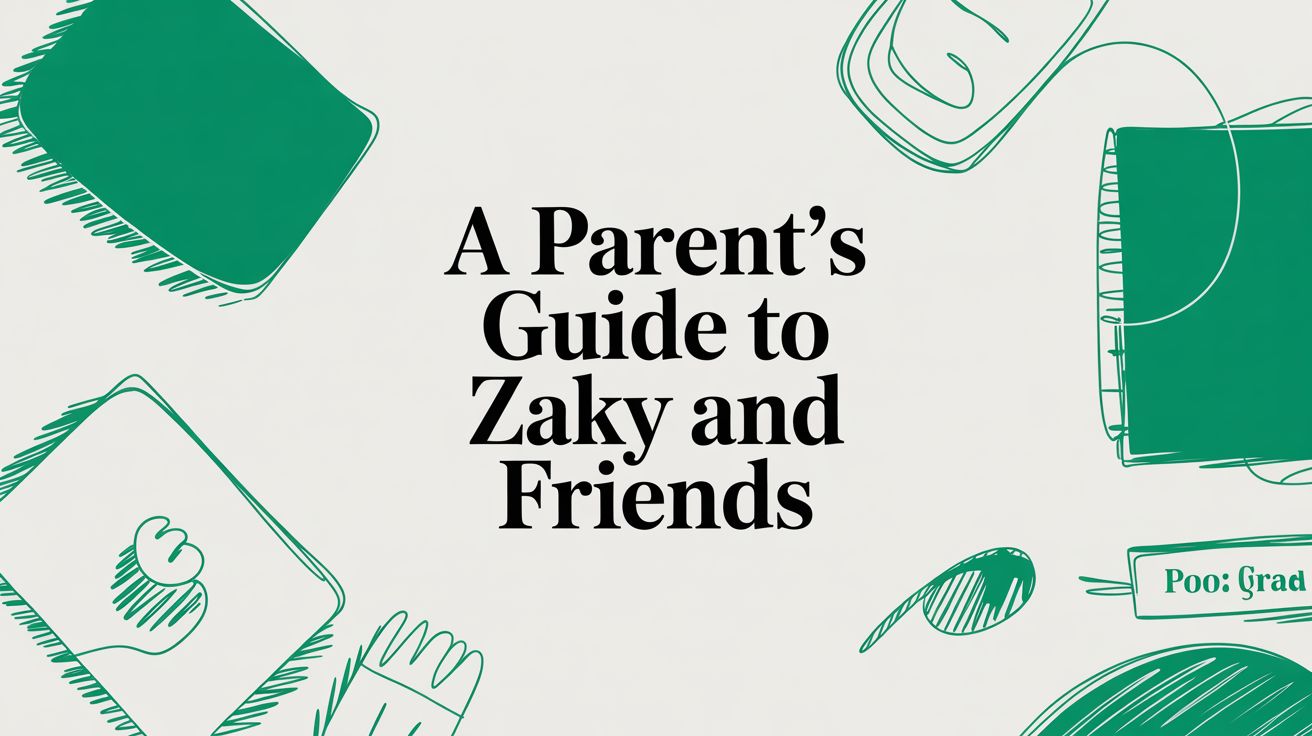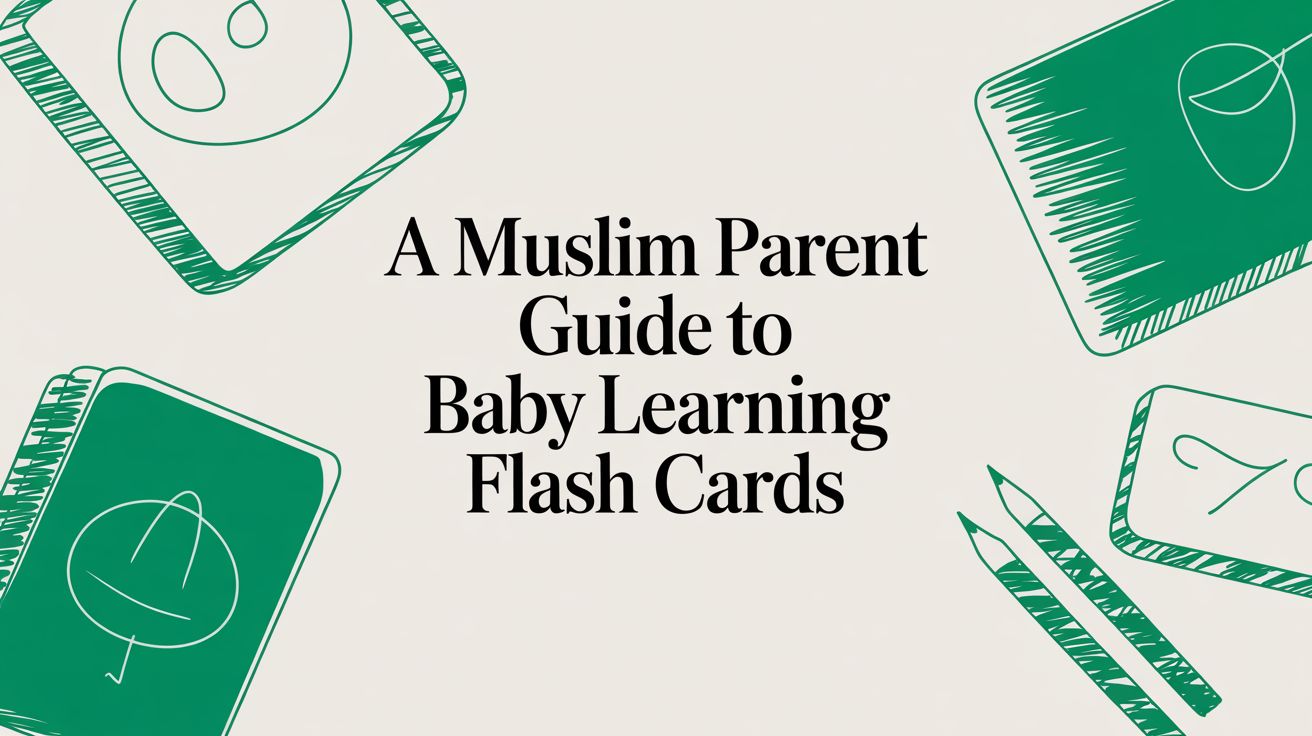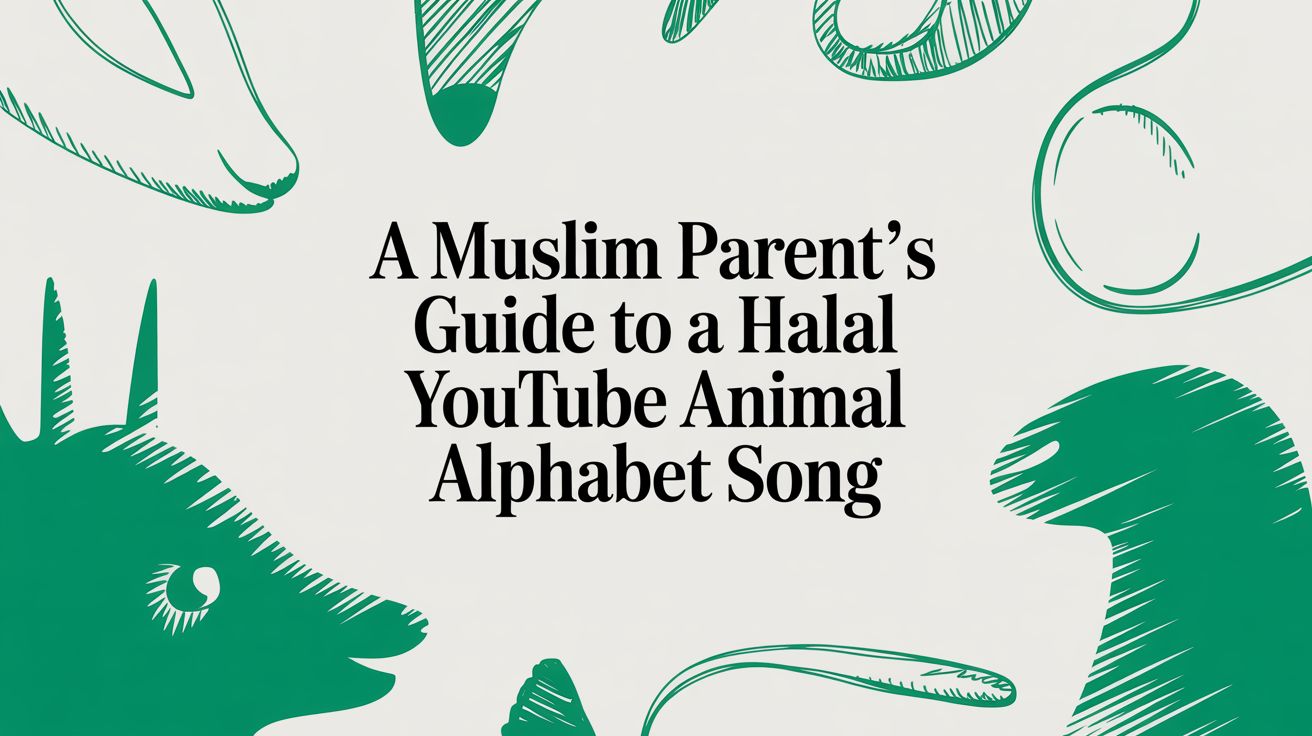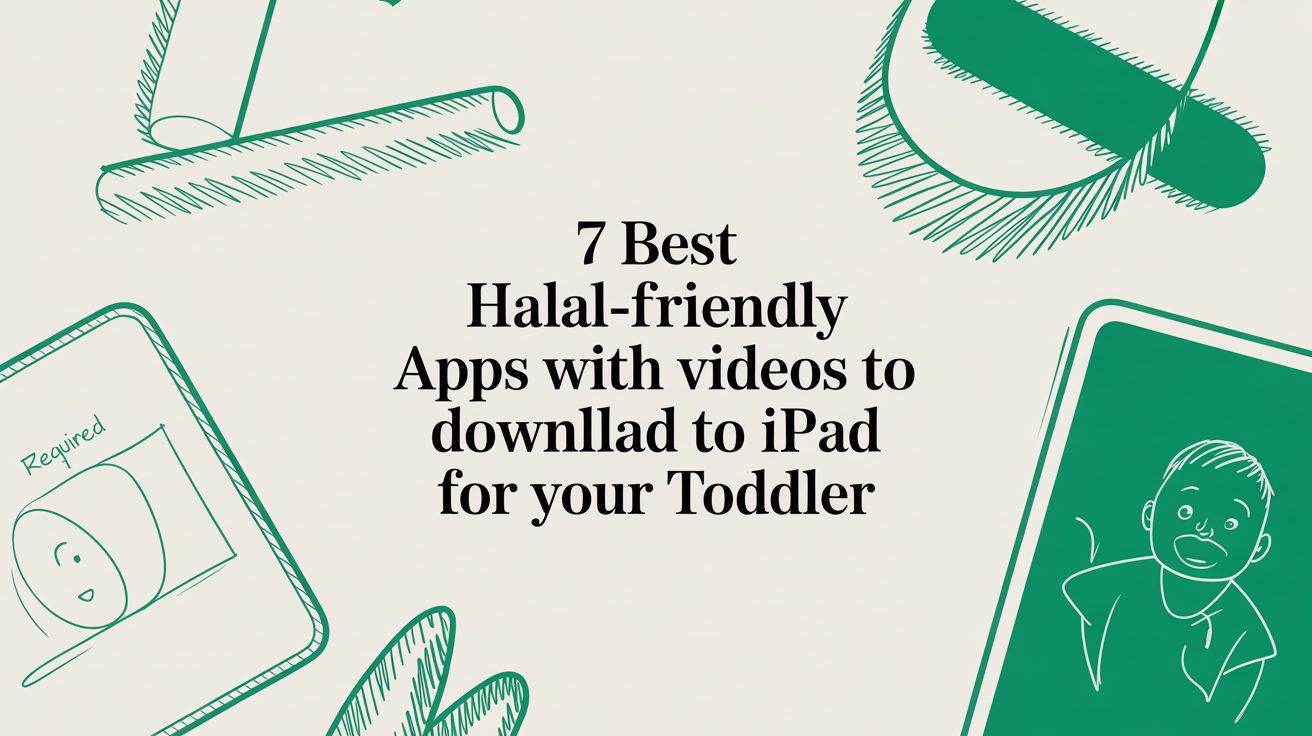As a Muslim parent, you've likely heard of Zaky and Friends, the popular animated series designed to introduce young children to Islamic values. With its gentle songs and friendly characters, it’s a household name. But is it really the right fit for the youngest members of our families—our babies and toddlers aged 0–3?
This guide will give you a clear, balanced look at the show to help you decide if it’s right for your little one.
What is Zaky and Friends All About?
Finding screen time that feels safe and aligns with your family’s faith can be a real challenge. We've all been there: you just need a few calm minutes to prepare dinner before Maghrib or focus on your salah, and you want to be sure that what your little one is watching is genuinely wholesome. Zaky and Friends was created to fill this exact need, offering a halal alternative to mainstream cartoons.
This is a common dilemma for parents. Many of us find ourselves weighing options, trying to figure out if popular shows are a good fit. If you're curious about this, you can explore our analysis on why some Muslim parents are concerned about shows like Peppa Pig.
Teaching Faith in a Gentle Way
At its core, Zaky and Friends aims to plant positive seeds of faith in a simple, gentle manner that won't overwhelm a young mind. The show avoids complex topics and instead focuses on the beautiful basics of being a Muslim.
It does this through:
* Modelling Islamic Manners: You'll see characters saying 'Bismillah' before starting something or 'Alhamdulillah' to show gratitude, reinforcing what you’re teaching at home.
* Simple, Kind Themes: Episodes often revolve around universal values like friendship, sharing, kindness, and appreciating Allah’s creations.
* A Calm, Steady Pace: The animation and storytelling are noticeably slower than many other cartoons. This is a huge plus, as it's much better for a developing toddler's brain than the fast-paced, overstimulating content that's so common today.
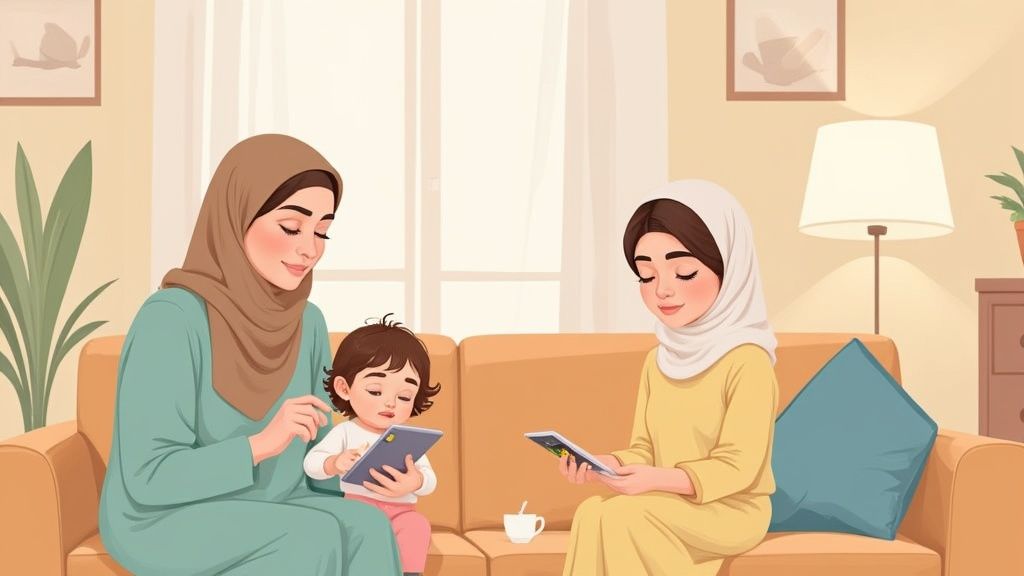
A Closer Look at the Characters
Let's meet the main crew. The show is built around Zaky, a friendly bee, and his diverse group of animal friends from around the world. Each character brings a different personality to the table, helping kids see that the Ummah is made up of all sorts of people.
These characters act as role models, demonstrating good adab (manners) and akhlaq (character) in their everyday adventures. They learn to navigate challenges with kindness and cooperation, all while reinforcing simple Islamic phrases and ideas.
For parents, here's a quick breakdown to help you get a feel for the show's suitability for the under-3 crowd.
Zaky and Friends at a Glance for Ages 0-3
| Feature | Relevance for Muslim Families (0-3) | Parenting Consideration |
|---|---|---|
| Simple Islamic Phrases | Introduces words like 'Bismillah' and 'Alhamdulillah' in a natural context. Great for early exposure. | Reinforce these phrases in your daily life. Repetition is key for toddlers. |
| Gentle Music & Nasheeds | The music is calm and often focused on praising Allah. It’s a positive, music-only alternative to mainstream shows. | Songs are catchy and can be sung together during playtime or car rides to extend the learning. |
| Slow-Paced Animation | Avoids the overstimulation common in many kids' shows, making it a better choice for developing brains. | This helps prevent toddlers from becoming overwhelmed and can lead to calmer viewing sessions. |
| Focus on Manners/Akhlaq | Teaches core values like sharing, kindness, and being truthful through simple stories. | Use the characters' actions as a starting point for conversations about good behaviour, even with very young children. |
Ultimately, Zaky and Friends offers a reassuring option for those moments when you need to rely on screen time. It provides content you can trust, built on a foundation of faith and positive values.
Getting to Know the Characters
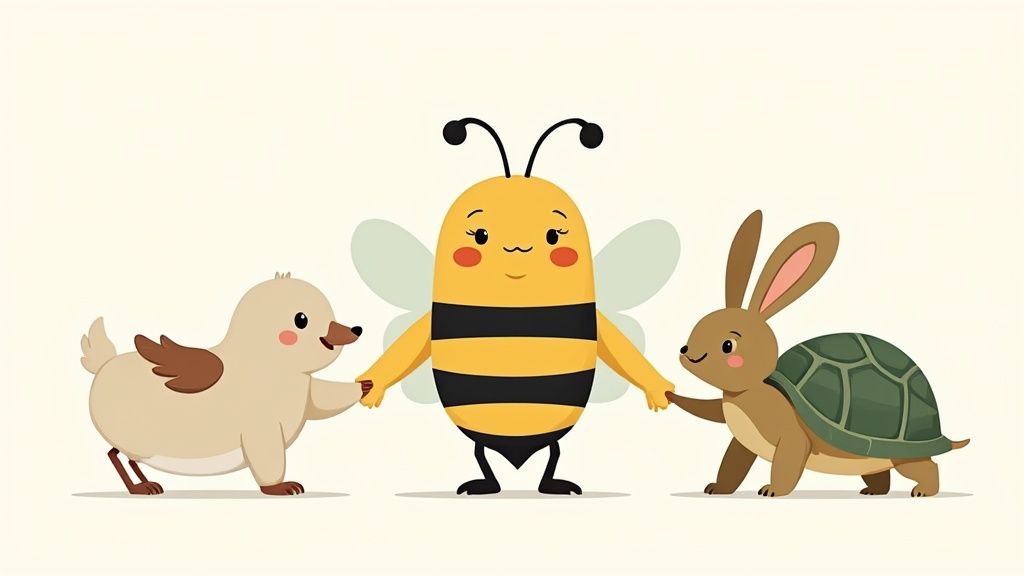
The heart and soul of the show is Zaky, a cheerful and inquisitive little bee. His gentle personality makes him instantly relatable, even for the tiniest viewers. He’s not a perfect character, but he always tries to do the right thing, which is a fantastic model for a toddler just starting to figure out the world.
From a parent’s point of view, Zaky is exactly the kind of main character you want for your child. He naturally weaves positive Islamic manners (adab) into his day in a way that a two- or three-year-old can easily grasp. Hearing him say "Bismillah" before starting something or "JazakAllah Khair" to a friend feels completely authentic and encouraging.
Zaky and His Diverse Group of Friends
Of course, Zaky doesn't go on his adventures alone. He's always surrounded by a wonderful group of friends from different backgrounds, and this is one of the show's quiet strengths. It subtly plants the seed of understanding the Ummah—our global Muslim community.
You'll quickly get to know characters like:
* Kazwa the Camel: He's often the wise and thoughtful one, showing the value of patience.
* Toofa the Bird: Energetic and always smiling, Toofa brings a lot of joy to their adventures.
* Hareem the Elephant: Strong and gentle, Hareem is the friend who's always there to help.
These friendships really drive the stories forward. The characters work together to solve simple problems, which is a great way to show your toddler how to share, take turns, and just be kind. Their teamwork and gentle way of speaking to each other are perfect examples for developing social skills.
The show’s focus on cooperation provides such a positive alternative to cartoons that often rely on conflict or silly arguments for laughs. It helps build a foundation of empathy and community from the very beginning, mirroring the values we want to see in our own families.
Exploring Core Islamic Values and Themes
Beyond the cute characters, what really resonates with Muslim families is how Zaky and Friends gently introduces the core of our faith. The show has a real knack for weaving Islamic values into simple, everyday situations that even a toddler can start to grasp. It’s all about planting those first positive seeds of faith in a way that feels completely natural.
This isn't about deep, complex fiqh. Not at all. It's about modelling the small, beautiful habits of a Muslim's daily life. You'll hear Zaky and his friends say "Bismillah" before they start to play or "Alhamdulillah" after a fun day. These are the exact phrases we're trying to teach at home, and seeing them on screen makes our job a little easier.
Making Big Ideas Small
The series does a fantastic job of breaking down big Islamic concepts into bite-sized lessons. An episode might explain the idea of sadaqa (charity) by showing friends sharing their toys, or it might touch upon Salah (prayer) by talking about the importance of thanking Allah.
The lessons are usually delivered through a few key methods:
* Simple Songs (Nasheeds): The show is full of catchy, voice-only tunes that teach kids about Allah's creations, the names of the prophets, or just the importance of having good manners.
* Story-Based Learning: Many episodes revolve around a simple moral story. A character might learn a lesson about being honest, or about being kind to animals, which ties directly back to Islamic teachings.
* Positive Phrasing: You'll constantly hear the characters using phrases like "Masha'Allah" when they see something amazing or "Insha'Allah" when making plans.
These foundational ideas are designed to click with a young child’s worldview. For example, connecting the phrase "Alhamdulillah" with finishing a delicious snack makes the concept of gratitude real and tangible for a two-year-old. Similarly, learning about the power of specific duas can feel very special for a little one. You can find more tips on teaching children important supplications like the dua for knowledge in some of our other guides.
The genius of Zaky and Friends is that it makes Islam feel like a warm, loving, and completely normal part of everyday life. It’s not a separate lesson to be learned but a natural way of being, which is exactly the foundation we want for our little ones.
A Look at Age-Appropriateness for Babies
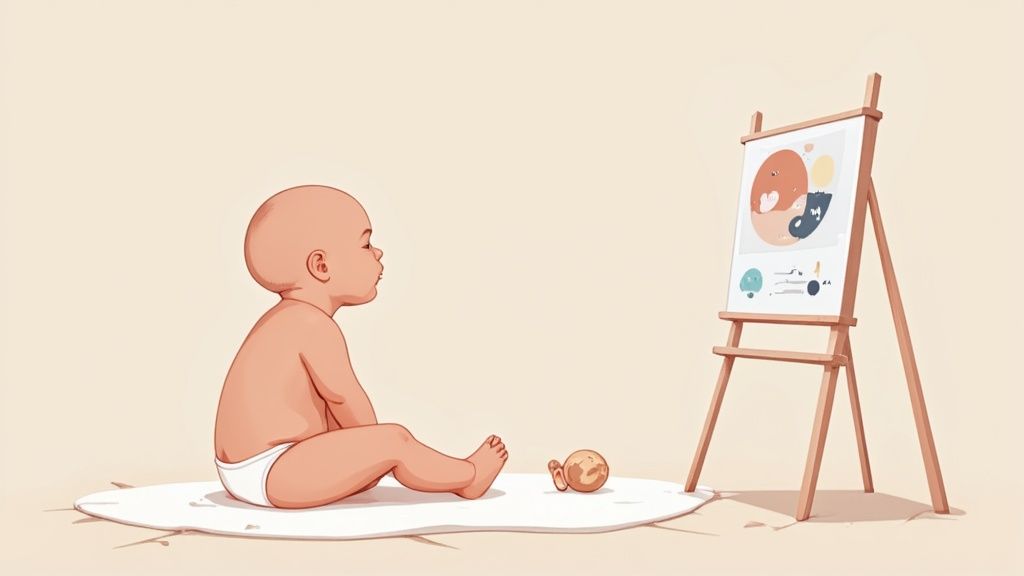
When we’re thinking about screen time for babies, the how is just as important as the what. For our littlest ones, the show's pacing, colours, and sounds matter just as much as the characters and stories. So, let’s take a closer look at how Zaky and Friends really stacks up for the 0–3 crowd.
Visually, the show is bright and colourful. The simple animation and friendly-looking characters are definitely designed to grab a toddler's attention, which is great. That said, the pacing can sometimes feel a bit quick for a child under 18 months. Their little brains are still figuring out how to process fast scene changes, and shows made specifically for infants tend to be much slower for this reason.
Where the show really shines, though, is its sound. The nasheeds are usually calm and melodic, and many use voice-only arrangements that a lot of Muslim families appreciate. This gentle vocal music is a world away from the loud, hyper pop songs in many mainstream cartoons. It helps create a much more peaceful vibe in your home.
Matching Content to Developmental Stages
Knowing where your child is developmentally is everything when deciding to introduce a show like Zaky and Friends. A one-year-old and a three-year-old are in completely different worlds.
- For Babies (Under 18 Months): A baby’s brain is wired for calm, slow, and simple. While they might enjoy the soothing nasheeds, the actual stories and quicker scenes could be a bit much. At this age, nothing beats learning through real-life interaction with you.
- For Toddlers (18 Months to 3 Years): This is where the show starts to hit its stride. A two-year-old is just beginning to follow simple plots and recognise their favourite characters. By three, they can start picking up on the moral lessons about kindness and sharing, making the show a helpful sidekick for teaching good manners (adab).
Ultimately, Zaky and Friends is best suited for older toddlers, typically from 24 months and up. This is the sweet spot where they can really start connecting with the stories and characters, moving from just watching to actually understanding.
How to Make Screen Time More Interactive
Let's be honest, sometimes you just need a few minutes. But watching a show like Zaky and Friends doesn't have to be a completely passive experience for your little one. With a bit of creativity, you can turn that screen time into a genuine moment of connection and learning.
It’s all about being present, a practice often called co-viewing. This doesn't mean you have to sit glued to the screen for the whole episode. Simply being in the same room, maybe folding laundry while your toddler watches, makes a world of difference. It sends a powerful message: what they're interested in matters to you, too.
Simple Ways to Engage Together
You can easily turn viewing into playtime with a few simple tricks. The great thing is, you’re probably doing most of this stuff already—it's just about applying it to what's on the screen.
- Sing the Nasheeds: When a catchy song starts, sing along! You can even hum the tunes later during a nappy change or on the way to nursery. It’s a lovely way to help them make connections.
- Point and Name: The animation is bright and full of things to see. Point to the screen and say, "Look, a camel! Masha'Allah," or ask a simple question like, "Where is the red flower?"
- Copy the Actions: See the characters raise their hands for dua? Do it with them. If Zaky shares a toy, you can say, "That was so kind, Alhamdulillah," reinforcing the good manners.
Using phrases from the show in your daily life—like saying ‘Masha’Allah’ when your child builds a tall tower of blocks—bridges the gap between their screen world and the real one. It makes the Islamic values they see feel natural and part of their own life.
This kind of interaction helps your child process what they’re seeing and, more importantly, it strengthens your bond. It's a simple way to make sure screen time stays a positive tool in your busy family life. The brand itself even encourages this connection through its wider ecosystem. For instance, their online platform is designed to help users connect in a fun, friendly environment. You can learn more about their approach to building community on their official site.
Comparing Zaky with Other Media Options
When you're looking for something for your toddler to watch, it feels like you're navigating a minefield of choices. Mainstream shows like Cocomelon are everywhere, but many parents find them visually overwhelming for little ones. The super-fast scenes and catchy-but-loud music can be overstimulating, and of course, the content is completely secular, missing the Islamic values you’re hoping to share.
On the flip side, the world of Islamic media is really blossoming. Zaky and Friends has long been a go-to for its gentle, faith-based lessons, and it holds a special place in many Muslim homes for good reason. But new options are popping up that take a slightly different approach. Some are built around the latest developmental science, while others, like Babymode, promise a 100% ad-free experience so you never have to worry about your child seeing an inappropriate commercial.
No matter what you choose to watch, making it an interactive experience is key.
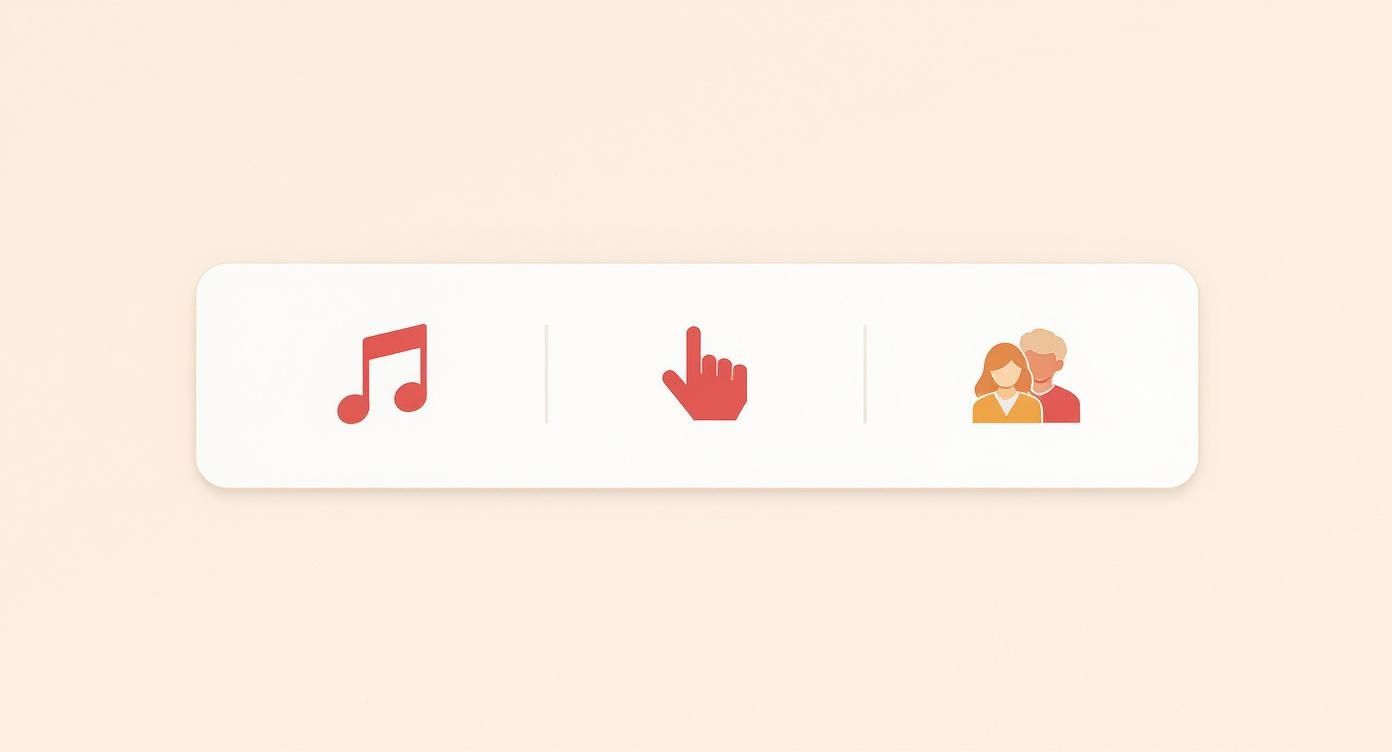
Simple actions like singing along, pointing out objects, and copying movements can turn screen time from passive watching into active, engaged learning.
Finding the Right Fit
At the end of the day, what works best really comes down to what your family needs most. Zaky and Friends is a wonderful and trusted resource for teaching those foundational Islamic manners in a way that feels warm and familiar.
If your top priority is a completely sealed-off viewing environment—free from ads and unpredictable algorithm suggestions—then it might be worth exploring some of the newer, purpose-built platforms. To dig a little deeper, you can check out our guide to Islamic alternatives on YouTube Kids.
Your Questions About Zaky and Friends, Answered
As a parent, you're always trying to make the best choices for your little one, and screen time is a big one. It's totally normal to have questions! Let’s walk through some of the most common ones that come up when families consider Zaky and Friends.
What’s the Sweet Spot for Age?
So, when should you introduce Zaky? While some of the simpler songs might catch the ear of a 12-month-old, the show really hits its stride with toddlers between 2-3 years old.
This is that magic window where they start piecing together simple stories and mimicking words. The lessons on kindness and saying "Alhamdulillah" really begin to stick at this age, making it the perfect time to start.
What About Music?
This is a big question for many Muslim families. A lot of Zaky and Friends content sticks to voice-only nasheeds or uses a simple duff for rhythm, which aligns with what many parents are looking for.
Their collection is massive, though, and styles can vary. If musical instruments are a concern for your family, it’s always smart to just preview an episode or two first to make sure it feels right.
Where Can I Find It Safely?
You can easily find Zaky all over YouTube, which is great for accessibility. But we all know how YouTube’s algorithm can sometimes serve up ads or suggested videos that are… less than ideal.
For a safer, more contained viewing space, a dedicated Muslim kids' streaming service is a fantastic option. It gives you peace of mind by keeping things ad-free and on-topic.
Is It a Good Fit for Our Family’s Beliefs?
Absolutely. One of the best things about Zaky and Friends is its broad appeal. The show focuses on core Islamic concepts that unite us all—saying "Bismillah" before eating, being gentle with animals, and loving our parents.
It steers clear of any complex fiqh or sectarian issues, making it a warm and welcoming introduction to Islam for virtually any Muslim family around the world.
If you're looking for a screen time experience specifically designed for the 0-3 crowd—one that’s halal, ad-free, and developmentally-focused right from the start—Babymode is creating a new path. We're building a curated library from the ground up with your family's values in mind.
Join the Babymode waitlist for early access and be the first to know.
